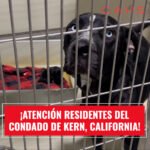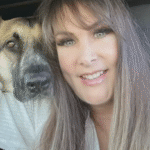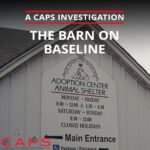Petland Kendall
8236 Mills Dr
Miami, FL 33183
(954) 442-3106
Date and time of CAPS investigation: 02/13/18; 1241
Approximate number of dogs observed at time of investigation: 36 puppies
Breeder information for individual puppies was not displayed in the store (5-10 (c) Certificate of Source). Puppies only had cards publicly displayed by their enclosures to show each puppy’s breed, reference number, date of birth, sex, color, and microchip number. A sign by puppy enclosures read, “We Are AKC Inspected. This store is inspected by the AKC and is authorized to sell AKC dog registrations and listing products.”
There were about 24 puppy enclosures, holding one to two puppies each. They had solid floorings with blankets inside to absorb urine. Enclosures were about 3.5 feet long, 2.5 feet wide, and three feet tall. Some held one to two puppies that were each 15-20 pounds in weight.
I asked an employee (Caucasian female, early twenties, long brown hair with glasses) about if puppies at the store come from puppy mills, and she responded, “No, our puppies come from the top ten percent USDA breeders.” I asked what that meant, and she answered, “Like that we get, they don’t come from puppy mills. We go like Midwest, and the owner gets the puppies.” I asked her to clarify, asking, “Oh, the owner personally goes there and gets them?” She said, “Yes. And gets them.”
She then admitted she wasn’t sure about exact conditions at the breeder’s facilities, but she and another worker showed me pictures of breeding facilities on an iPad. The images showed the owner and breeders with dogs and puppies in yards, and the only pictures of facilities showed clean dog runs. The pictures gave names of kennels with some breeder names, and I noted one USDA license number. The employee repeated to me as she swiped through the photos, “We get all the puppies from the top ten percent USDA breeders.”
I asked to see a Pug puppy and the puppy’s paperwork. The paperwork showed the puppy was bred by David L Graber in Odon, IN, with the USDA number left blank. The employee let me photograph the information in front of her. I then asked to see a Boston Terrier puppy, as well as the paperwork. I stated that I wanted to do an internet search on the breeder to see if “it’s a good breeder.” The second employee (Hispanic female, early twenties, with long black hair) said she would have to ask someone to show me the paperwork. I responded, “Okay.” She then immediately, said, “We wouldn’t be able to bring out that information unless you actually purchase the puppy.” I pointed out that the other worker showed me breeder information on the Pug, and she said, “Yeah, we’re not supposed to do that.” I asked, “You don’t show breeder information to customers?” I responded, “Once, like you are really interested and you want to take the puppy home, then yes.” I repeated to her I wanted to verify if the breeder of the Pug was reputable. She then agreed to show me the puppy’s paperwork. However, all she showed me was a piece of a paper towel with the name “Melvin Nisley” hand written on it. I asked her if she knew where the breeder is from, and she said, “Up north.” I asked, “You don’t know what state, or anything?” She shook her head and said I can search his name to get information on him and see if he’s USDA licensed.
Evidence of false statements and misrepresentations of breeders by store
One of the employees said their breeders are from the top ten percent USDA breeders and offered a rambling comment when I asked what that meant. Neither the USDA nor any organization associated with commercial breeders has ever made a list of “top ten USDA breeders.” This statement appears to be something completely made up and without merit of any kind.
The photographs of breeders’ facilities shown by the employees are also misleading. For example, the name an employee was reluctant to show me was that of Melvin Nisley, who was not mentioned in the in photos of breeders the store’s owner has visited. USDA photographs of Nisley’s kennel show dogs in wire cages, with no access to the ground.
The store’s photographs of Cloveridge Kennels show a clean facility, with clean outdoor runs. USDA photos of the facility show dogs living in wire cages, and outdoor runs with concrete floorings covered in feces and urine stains.
Breeder information obtained during store investigation
David L Graber, 9813 N 875 E, Odon, IN 47562
Melvin Nisley, Seymour, IA, 42-A-1470
Cloveridge Kennel, Marvin and Rosemary Mullet, Corydon, IA, 42-A-1515
Dayne’s Ridge Kennels
Oakridge Kennels (Levi Yoder)
Stoney Creek Kennels (Ivan Troyer), 42-A-1534
Broker information obtained from 2018 Certificates of Veterinary Inspection
Blue Ribbon Puppies (Levi Graber), Odon, IN, 32-B-0233, 108 puppies and three kittens at 5/5/21 USDA inspection
Graber brokers puppies and kittens from many breeders, most of whom are Amish and Mennonite. He does not breed. His 5//5/21 USDA inspection report listed 108 puppies and three kittens. His 8/38/19 inspection report listed 308 puppies.
From a report by ASPCA, which obtained CVIs from August 2019 – December 2020:
Blue Ribbon Puppies in Indiana is the single largest supplier to Florida pet stores. The Centers for Disease Control (CDC) linked Blue Ribbon Puppies as one of the puppy brokers in a multi-state, multi-drug resistant Campylobacter disease outbreak caused by contact with puppies sold at pet stores. According to the CDC’s investigation, Florida had the second highest number of Campylobacter infections nationally. Blue Ribbon Puppies was a major supplier of Petland stores in Florida, shipping to locations in Largo, Plantation, Pembroke Pines, Davie, Naples, Kendall, Fort Walton, Orlando, and Pensacola.
The owner of Petland Kendall also has franchises in Plantation, Pembroke Pines, Davie, Naples, Largo, and Doral (opened in September 2021).
https://www.cdc.gov/campylobacter/outbreaks/puppies-12-19/index.html
CAPS investigated breeders selling to Levi Graber for a November 2007 two-part story with WTHR, the NBC Indianapolis affiliate. Every one of these breeders had a puppy mill. Three of them did not have a USDA license, although they had more than four breeding females (requirement is now five).
https://caps-web.org/indianas-puppy-pipeline-wthr-com/
“Indiana’s Puppy Pipeline,” Parts 1 and 2, WTHR Indianapolis (NBC)
Unlicensed breeders who were selling to Graber (video was shot in VHS and couldn’t be transferred so is unavailable):
https://caps-web.org/graber-vera-and-abe/
https://caps-web.org/raber-ken/
https://caps-web.org/wagler-delilah-jean/
The following breeders were selling to Blue Ribbon. CAPS obtained their names from cage cards at New York pet shops, which listed Blue Ribbon as the broker.
https://caps-web.org/graber-darrell/
Darrell Graber discusses how he uses Levi Graber as his broker and discusses the breeding industry, including how older breeding dogs have no teeth left. He referred the CAPS investigator to Levi Graber, who was texting his breeders the entire time to see if they knew anything about the investigator.
https://caps-web.org/stoltzfus-john-sunny-hollow-kennel/
John Stolzfus investigation report and video
https://caps-web.org/justin-knepp/
Justin Knepp investigation report and video
https://caps-web.org/miller-wayne-karen/
Wayne and Karen Miller investigation report and video
https://caps-web.org/wagler-richard/’
Richard Wagler investigation report and video
https://caps-web.org/steven-yoder/
Steven Yoder investigation report and video
CAPS has investigated hundreds of Amish and Mennonite dog (and one cat) breeders in Pennsylvania, Ohio, Minnesota, Iowa, Missouri, Kansas, and Illinois. Most of these facilities had substandard, inhumane conditions. In addition to the story with WTHR in Indianapolis, CAPS worked on news stories with The Philadelphia Inquirer and “20/20” about Amish breeders and brokers. In general, the Amish view dogs and horses as livestock, not as companion animals. In fact, one Amish breeder stated in The Philadelphia Inquirer story that English people (how Amish refer to those outside the Amish community) don’t understand that dogs are merely livestock. He failed to understand why the English got so upset when dogs died.
Holmes for Canine (now Preferred Canine LLC), PO Box 336, Sugarcreek, OH, 31-B-0197; physical address: 29952 CR 10, Fresno, OH (residence of Abe Miller, which is listed as an agricultural property under county tax records)
The owner of Preferred Canine is Abe Miller in Fresno, Ohio. Miller has a long history of selling sick puppies, violating the Animal Welfare Act, and being the subject of lawsuits. https://tinyurl.com/y5c26kqz
Every time, Miller is in trouble, he changes the name of his facility. When Sarasota County held a hearing for the ordinance banning the retail sale of dogs and cats in January 2016, he testified against the ordinance, using the kennel name of Quail Creek. Certificates of Veterinary Inspections over the last few years showed him using the names, Comfort Canines and Holmes for Canines. Miller hired a bus to transport at least 30 of his Amish breeders to testify against the ordinance, which passed in January 2016.
The dogs he brokered included those with the campylobacter virus that made dogs and people ill in the outbreak at numerous Petland stores.
https://www.cdc.gov/campylobacter/outbreaks/puppies-12-19/index.html
Lack of USDA violations
The fact that few breeders and brokers have USDA violations does not mean that none exist. During our undercover investigation of USDA-licensed facilities, we document violations. USDA has made it very easy for licenses not to have violations. In response to regulatory ordinances, USDA started using teachable moments, self-inspections and a trial announced inspection program. Their recent guidelines also instructed inspectors not to cite ear, eye and dental diseases as veterinary care violations (this requirement was recently changed back). It is for these reasons that USDA Animal Welfare Act violations have significantly decreased.




